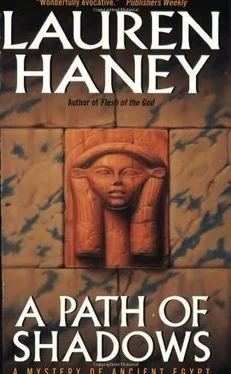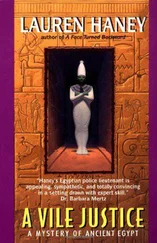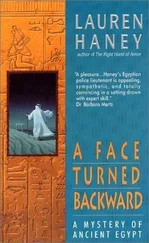Lauren Haney - Path of Shadows
Здесь есть возможность читать онлайн «Lauren Haney - Path of Shadows» весь текст электронной книги совершенно бесплатно (целиком полную версию без сокращений). В некоторых случаях можно слушать аудио, скачать через торрент в формате fb2 и присутствует краткое содержание. Жанр: Исторический детектив, на английском языке. Описание произведения, (предисловие) а так же отзывы посетителей доступны на портале библиотеки ЛибКат.
- Название:Path of Shadows
- Автор:
- Жанр:
- Год:неизвестен
- ISBN:нет данных
- Рейтинг книги:5 / 5. Голосов: 1
-
Избранное:Добавить в избранное
- Отзывы:
-
Ваша оценка:
- 100
- 1
- 2
- 3
- 4
- 5
Path of Shadows: краткое содержание, описание и аннотация
Предлагаем к чтению аннотацию, описание, краткое содержание или предисловие (зависит от того, что написал сам автор книги «Path of Shadows»). Если вы не нашли необходимую информацию о книге — напишите в комментариях, мы постараемся отыскать её.
Path of Shadows — читать онлайн бесплатно полную книгу (весь текст) целиком
Ниже представлен текст книги, разбитый по страницам. Система сохранения места последней прочитанной страницы, позволяет с удобством читать онлайн бесплатно книгу «Path of Shadows», без необходимости каждый раз заново искать на чём Вы остановились. Поставьте закладку, и сможете в любой момент перейти на страницу, на которой закончили чтение.
Интервал:
Закладка:
The next morning, the garrulous overseer escorted Bak and the men in User’s party over the surrounding hillsides, delighted to show off his domain. The mines, scattered throughout the area and especially abundant in the next wadi to the east, were much like those on the mountain of turquoise but were more widespread, more abundant, and larger. Here, too, the miners were men from afar, come to toil for Maatkare Hatshepsut and the generous earnings they would take back to their faroff homes. From shafts penetrat ing deep into the hillsides, narrow galleries followed the ore, often widening into underground halls. The tunnels formed complicated networks through which the heavy loads of ore had to be dragged and, in the end, lifted up to the surface.
Ani and Nebenkemet asked a multitude of questions, and
Nenwaf immediately warmed to them both. Unlike Teti, he allowed Ani to sort through the piles of malachite brought to the surface and take as many chunks of the bright green stone as he wished. It was less valuable than turquoise and not as appealing to the eye. Nonetheless, the pudgy jeweler avidly picked up one chunk of rock and another, filling the filthy square of cloth he carried. When he had a good-sized collec tion, he spread them out on the ground and sorted through them, ultimately saving just two or three choice pieces.
As the morning wore on, Nebenkemet’s knowledge of mining became ever more apparent and Nenwaf began to speak to him on equal terms. Bak was intrigued. He doubted
Amonmose would have brought this man into the desert if he thought him unable to build huts and a boat, but he was no simple carpenter.
After a midday meal of bread and beer supplemented with green onions and cucumbers harvested from Nenwaf’s gar den, the overseer led them across the wadi floor past slag heaps containing greenish black lumps of malachite from which much of the copper had been drained. On the hillside beyond, he escorted them to a dozen furnaces where men toiled in the heat. He stopped at one of the few not being worked. It had recently been used, he explained, and had been left to cool. A pile of greenish rock, crushed for easier smelting, lay beside the furnace.
“As you can see,” Nenwaf said, “we’re using the latest methods of extracting the ore from the stone.”
Nebenkemet hovered close, hands clasped behind his back, studying the clay-lined pit dug into the hillside. Rather than the more common goatskin bellows on which men stood to pump air into the furnace, the newer pot bellows were used. Here, a leather top on the flared opening of a pottery nozzle could be pumped up and down by hand or by foot, blowing air into the furnace to make it burn hotter, allowing for a more efficient production of copper from stone.
“By locating the pit on the hillside,” Nenwaf said, “we can take full advantage of the wind that usually blows up the wadi, causing the fire to burn more fiercely.”
“What do you place in the furnace to aid in the separation process?” Nebenkemet asked.
“Several materials found locally.”
Nenwaf went on to discuss the process in detail. As far as
Bak could tell, the method was cruder than that employed at the fortress of Buhen to smelt gold, but similar. He glanced at his companions. Other than User, who looked a bit bored, all but Nebenkemet appeared overwhelmed by the description.
The carpenter followed the overseer’s explanation with no trouble and at times asked questions as difficult to compre hend as were the answers.
Bak was about ready to shout “Enough!” when the over seer pointed out the shallow pit flanked by stones in front of a hole in the base of the furnace. At the bottom, a lump of molten copper had begun to congeal as it cooled.
Ushering them on, Nenwaf showed them every phase of the process: men crushing the stone, loading the furnaces, operating the bellows. If User had not noticed that a long line of donkeys was being led to the place where the ingots were stored for transport, the overseer would probably have gone on for the rest of the day.
As they walked back toward the caravan, Bak drew
Nebenkemet aside. “Who are you, Nebenkemet? What are you?”
The man looked him straight in the eye. “I don’t know what you mean.”
“You may well be a carpenter, but you’ve a knowledge of mining that few men can claim. You grasped every word Teti said, and while Nenwaf’s explanation was beyond my under standing, you spoke with him on equal terms.”
During the ensuing silence, a breeze rustled the leaves of an acacia and a desert lark sang its solitary song. The blow ing and complaining of donkeys marked the progress of the loading, along with the shouts of soldiers and an occasional laugh.
“I’ve a natural curiosity, that’s all.”
“No.”
Nebenkemet swung around to face him, his mistrust ap parent, his dislike for what Bak represented if not for the man himself. “I’ve known other men like you, Lieutenant. Quick to charge a man with some foul deed and quicker yet to take away his life, sending him far away from home and family, ofttimes to his death.”
Smothering resentment at so offensive an assumption, Bak kept his voice level, unemotional. “You were a prisoner,” he guessed.
“You may as well speak the truth,” Amonmose said, hurry ing up to lay a hand on Nebenkemet’s shoulder. “You know nothing of pretense. A blind man could’ve seen that you know as much if not more about mining and smelting than
Nenwaf himself.”
Nebenkemet shook off the hand and glared at Bak. “Do you think to accuse me of slaying the men who’ve died since we set out from Kaine?”
“I seek the truth, nothing more.”
Amonmose hovered close as if he feared they would clash.
“I believe the lieutenant to be a fair man, Nebenkemet. If you say nothing, he’ll be bound to believe the worst.”
“He’ll think the worst no matter what I say.”
“Are you in truth a carpenter?” Bak demanded. “Or are you a miner?”
“Tell him,” Amonmose urged.
“The knowledge may not help me find the slayer,” Bak said, “but if it serves to eliminate a single individual-you I’ll be one step closer to snaring that vile criminal. Closer to saving the life of yet another man who might stand in the way of his dagger.”
Nebenkemet looked at Bak and at his friend, his defiance slowly crumpling, turning to indecision.
“What you’ve done in the past is of no concern to me.”
Bak veered around the branch of an acacia. “I came into this desert with a task to perform, and that I mean to do. I’ve no interest in anything other than that.”
Nebenkemet glanced at Amonmose for support, received a quick nod of encouragement. Staring straight ahead, into the past, he said, “I labored in a shipyard in Mennufer, appren ticed to a boat builder. Young and foolish, thinking to make myself look more of a man, I stole a small bauble for a woman I coveted. I was caught within the hour.” He glanced again at Amonmose, who urged him on with a concerned smile. “I was sentenced to spend four years toiling in a mine in the desert east of Abu. Unlike my fellow prisoners, I liked mining, and I had a nose for following the veins of ore. The overseer raised me to the level of assistant and asked me to stay when my punishment ended. I refused.” He expelled a bitter laugh. “I thought to return to my old life in the shipyard in Mennufer, but my master turned me away. I was a crimi nal, a man who couldn’t be trusted.”
Amonmose, seeing his friend’s distress, took up the tale.
“I knew Nebenkemet as a youth. When I came upon him in a house of pleasure, angry and besotted, talking of revenge, I took him away and washed the beer from him. When I heard his tale, I asked him to come with me.”
Читать дальшеИнтервал:
Закладка:
Похожие книги на «Path of Shadows»
Представляем Вашему вниманию похожие книги на «Path of Shadows» списком для выбора. Мы отобрали схожую по названию и смыслу литературу в надежде предоставить читателям больше вариантов отыскать новые, интересные, ещё непрочитанные произведения.
Обсуждение, отзывы о книге «Path of Shadows» и просто собственные мнения читателей. Оставьте ваши комментарии, напишите, что Вы думаете о произведении, его смысле или главных героях. Укажите что конкретно понравилось, а что нет, и почему Вы так считаете.












